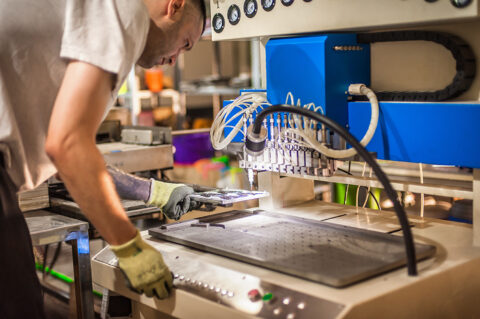If you’re trying to make sense of where American manufacturing is heading, this week delivered a potent mix of signals. The June Manufacturing PMI ticked up slightly to 49.0, still in contraction territory but hinting at a potential inflection. Beneath that surface-level number, however, a deeper story is unfolding—production is expanding again, even as new orders and hiring continue to slide. This tells us manufacturers are fulfilling backlogs, but demand and workforce stability remain fragile.
Meanwhile, two major trends are converging: the AI-driven reshaping of U.S. industrial strategy, and a renewed surge of investment into Southern manufacturing corridors. Jabil’s $500 million announcement for an AI and cloud hardware facility in North Carolina is just the latest signal that America’s industrial capacity is pivoting toward digital infrastructure. That same state is also preparing for the opening of Toyota’s new EV battery plant, part of a broader push to regionalize clean tech manufacturing.
But it’s not all forward momentum. The latest round of tariff hikes is creating confusion for smaller firms, many of which are now delaying new product launches or pulling back on innovation investments. At the same time, larger companies like Honeywell and Generac are seizing the moment—shifting aggressively to serve the exploding demand from U.S. data centers. That disparity raises critical questions: Who gets to lead in this reshoring moment, and what tools are being deployed to ensure small manufacturers can compete?
Add in a flattening regional outlook from Texas, renewed scrutiny over Apple’s offshore production, and continued fallout from the U.S. Steel–Nippon merger, and it’s clear: the 20- to 30-year reshoring shift isn’t slowing down—but it’s facing real growing pains. This week’s developments highlight the need for an industrial strategy that empowers small manufacturers, strengthens domestic networks, and ensures America doesn’t lose this opening inning advantage.
📰 MAIN STORIES
🏭 Jabil’s $500M Bet on AI Hardware in North Carolina
Jabil will invest $500 million in a new Rowan County, NC facility focused on AI and cloud computing hardware, creating 1,181 jobs with average salaries of $62,000 (AP News, July 1).
Why it matters: The reshoring conversation just got real—this isn’t a pilot project, it’s scale manufacturing to support AI infrastructure.
The bigger picture: Traditional manufacturers are pivoting fast to meet the demands of the $400B+ U.S. data center boom. Honeywell and Generac are making similar moves, expanding their relevance in this AI-industrial convergence (FT, July 3).
📉 PMI Shows Output Growth Amid Weak Demand
June’s ISM Manufacturing PMI inched up to 49.0—still signaling contraction but with production rising to 50.3. However, new orders (46.4) and employment (45.0) remained in decline (RTT News, July 1).
Why it matters: Factories are clearing backlogs, not ramping for new demand. The workforce remains tight, and small businesses are especially vulnerable.
The bigger picture: This recovery needs more than rate cuts—it needs intentional support for supplier networks and demand-side certainty.
🚗 North Carolina Is America’s Manufacturing Hotbed
With Toyota’s EV battery plant and Jabil’s AI hardware facility, North Carolina is adding over 2,900 new manufacturing jobs in under a year (Wikipedia, July 2).
Why it matters: These aren’t one-offs—they reflect years of coordinated policy, infrastructure investment, and workforce preparation.
The bigger picture: Regional advantage is real. States that build collaborative ecosystems are winning the reshoring race.
🔧 Tariffs Create New Pressure for Small Manufacturers
Recent tariff increases—steel and aluminum at 50%, new appliance tariffs in late June—are creating real friction for small and mid-sized firms (Wikipedia, June 28).
Why it matters: Some small businesses are delaying product launches or pulling back on innovation due to cost uncertainty.
The bigger picture: Tariffs can support resilience, but only if paired with procurement access, capital tools, and clear signals for small suppliers.
⚡ QUICK HITS
-
Texas Flatlines: Dallas Fed’s June survey shows –7.3 in both new orders and shipments, and a negative business outlook of –8.9 (Dallas Fed, July 1).
-
U.S. Steel’s $14B Deal Finalized: Nippon Steel acquisition maintains HQ in Pittsburgh and grants D.C. oversight (Wikipedia, July 2).
-
Apple Faces Reshoring Pressure: Trump pushes for iPhone production in U.S. as India now makes 18% of units (Times of India, July 4).
-
Op-Ed Urges AI-Enabled Factory Strategy: Washington Post editorial warns U.S. is falling behind China on industrial modernization (Washington Post, July 6).
🔚 CLOSING
The story this week isn’t just one of macro metrics—it’s about momentum. The numbers show production turning a corner, but the investment patterns reveal something more enduring: America’s industrial base is being rebuilt around AI, EVs, and advanced manufacturing—with North Carolina leading by example. The opportunity now is to ensure this momentum lifts everyone, not just the biggest players. That means tools, training, and technology designed to help the long tail of small manufacturers thrive. The reshoring race is on—and the winners will be those who can connect fastest and build together.




